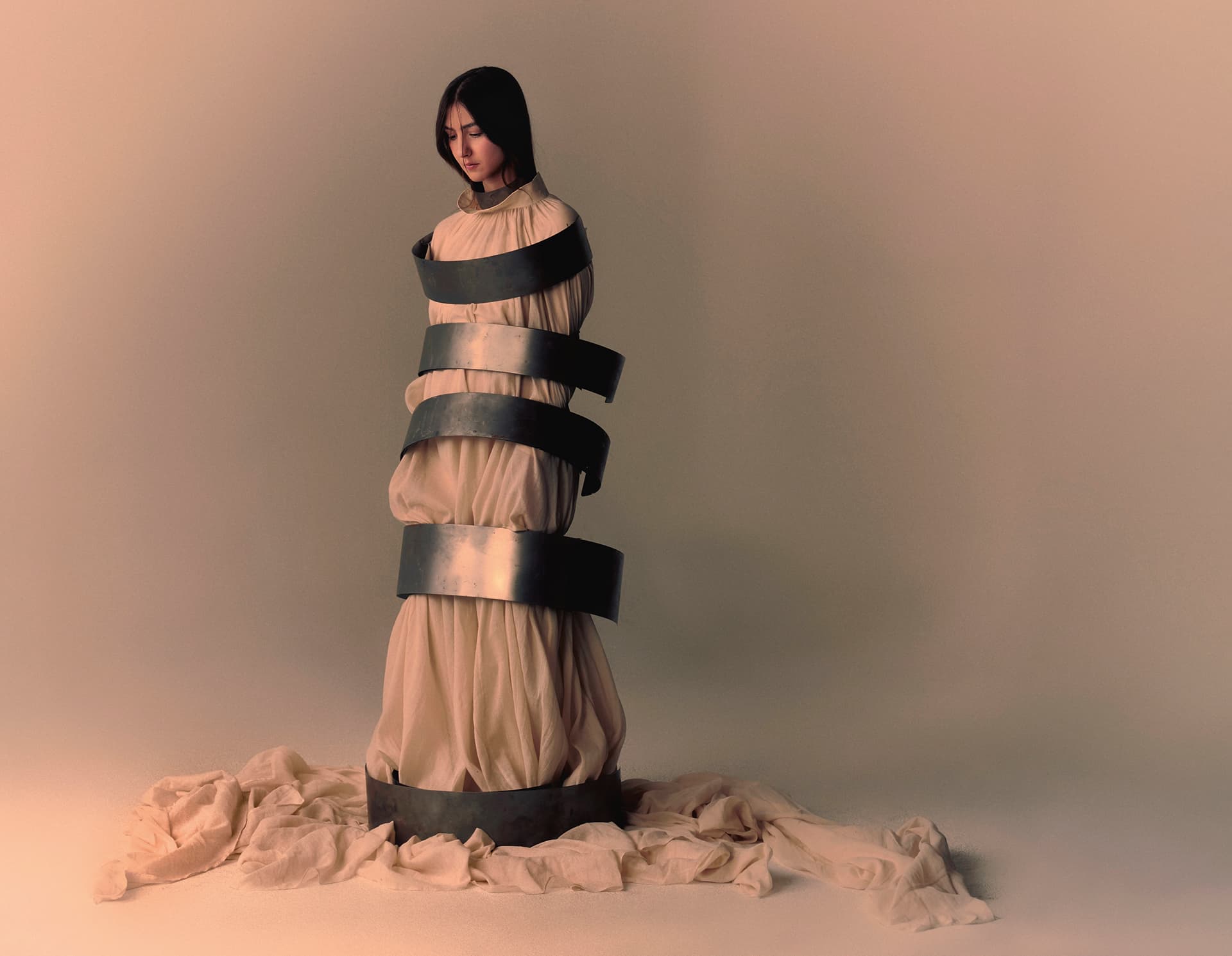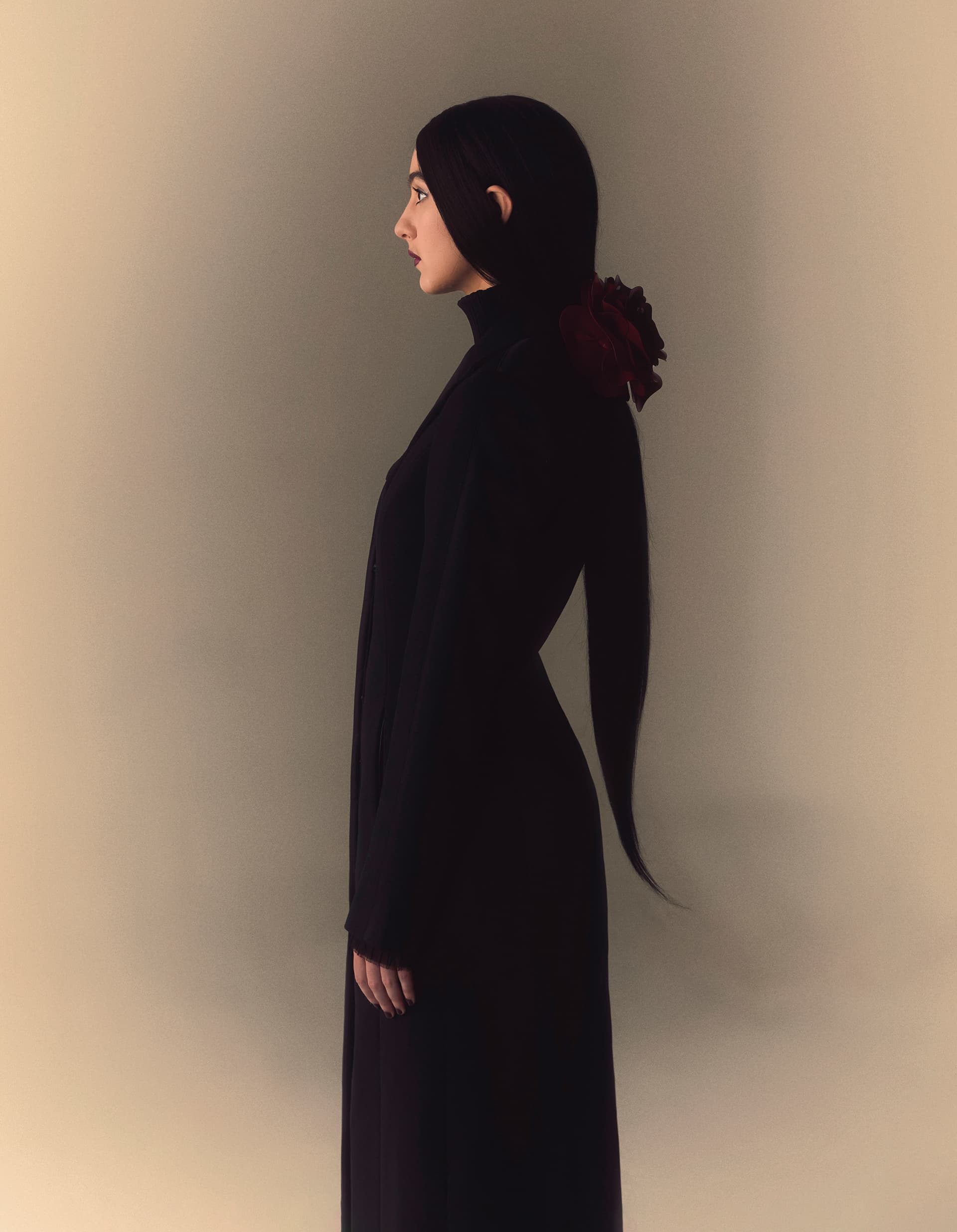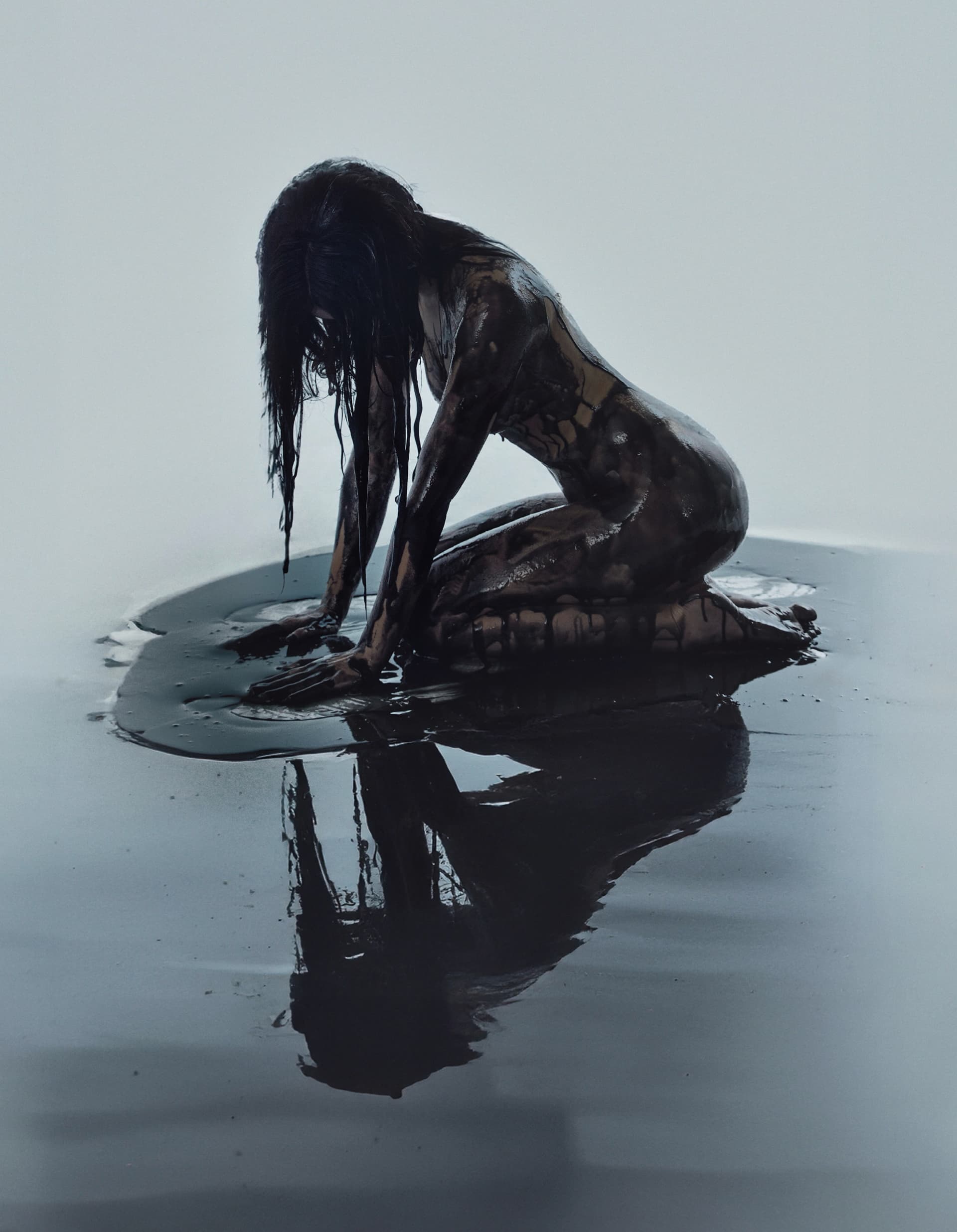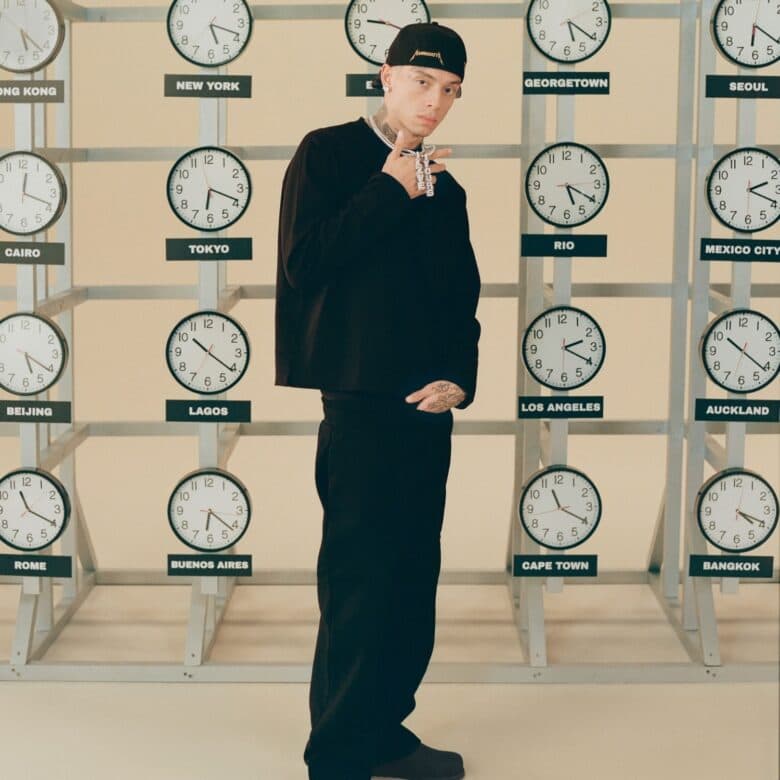Weyes Blood — millennial soothsayer for the end of times

- PhotographerLe3ay
- Writer Nessa Humayun
Natalie Mering – the indie musician known as Weyes Blood – has always been keenly aware of the end of times. From her home in LA, she tells me about growing up with the Nineties version of environmentalism, which served to perpetuate the myth that, as she rolls off drolly, “All we have to do is clean up the planet.” It was as a teenager that the effects of climate change became really obvious to her: “We started having weirdly warm winters and I watched the places I used to visit as a kid have these mass shifts and die off. Enough happened to grasp that we’re barrelling off a cliff with no real safety net. That was a big moment for me in terms of understanding the urgency of it all.”
While urgency may be at the heart of Mering’s work, it certainly doesn’t sound like it. Under Weyes Blood (derived from and pronounced like Flannery O’Connor’s seminal Southern Gothic novel, Wise Blood), the 35-year-old makes music that is so sumptuous and ethereal that it is almost otherworldly. Her nostalgic, baroque-pop melodies and the hair-raising beauty of her voice have led to comparisons to Karen Carpenter, Joni Mitchell, and that special strain of 60s, Laurel Canyon Americana. In that sense, (and despite erring more psychedelic) there is a feeling that Mering is continuing the legacy of the country’s great female folk singers — albeit with the heavy burden of modernity.

In 2019, after stretches in Pennsylvania, Philadelphia, and New York, Mering returned to her native California to release her most commercially successful album to date, Titanic Rising. The first of a trilogy, it foretells catastrophe. “I could feel that shit was about to hit the fan,” the musician recalls, “It was a fever pitch moment. The pandemic made that very obvious, but before, it was still up for debate.” In it, Mering seems to sing from the waterlogged 90s bedroom of her album cover; she laments the rising tides, wildfires, felled trees, longs for the innocence of childhood, and despairs over technology’s impact on human connection. It is purposefully on the nose. On ‘Wild Time’ where she sings about how “everyone’s broken now”, the song starts and ends with arrangements from ‘Nearer, My God, To Thee,’ the hymn the band on the Titanic reportedly performed as it sank. Mering, a movie buff, is a huge fan of the 1997 film — but still, it is an apt metaphor: down with the ship we go.

Does she ever get bogged down by it all, I ask — querying about the role of the artist in facilitating change. “That’s a confusing thought because I do feel like you should never assume people are unable to change,” she replies. “Change is the one constant of the universe. I think it’s just difficult to overcome the echo chamber quality of our medium of communication. The public discourse happening now is influenced by algorithms so it’s not a fair sample of humanity.” She pauses: “But I do feel like I’m riding into an abyss. Any change that I would make would be theoretical, like a salve to help people cope with the feelings of powerlessness in the scope of an incomprehensible gridlocked culture.”
With her elvish features, and long dark hair, which hangs heavy either side of her parting, it’s easy to picture Mering as some kind of Millennial sooth-sayer. As she speaks; in long, thoughtful, self-assured sentences, I’m reminded of Cassandra of Greek mythology; the Trojan priestess cursed to foretell truth prophecies that would fall on deaf ears.
Natalie Laura Mering was born in Santa Monica, California, to musician parents. Her father was in the New Wave band, Sumner, which once opened for the knack in the late 70s. Impressively, he also had flings with Joni Mitchell and Anjelica Huston. She is no nepotism baby, though. After music didn’t work out, her parents became strict, born-again Pentecostal Christians, went corporate, and relocated her, aged 11, to a small town called Doylestown in Pennsylvania.
Religion wasn’t to last. “I was raised with a certain cosmology and when I hit puberty all the little hairline cracks and the system behind it just started to rupture,” she explains. “Out of nowhere, I just became a little mini adult. I was ready to expand into other cultures and couldn’t believe that every idea about god came from the same place. I felt in my heart that everybody was trying their best. I remember being in a youth group and wondering, ‘what about the little girl in an Amazonian tribe that’s never heard the gospel? She’s just going to rot in hell’”. Mering pauses, and adds with a laugh: “Now do me a favour and do not make that the quote. I’m very done with disappointing my mother. But yeah, I think a lot of it has stayed with me in a sort of God shaped hole created by that system of attributing meaning to things. Now, I have a patchwork cosmology that includes the more esoteric Christian stuff alongside everything else I’ve discovered along the way.”

That vacuum was filled by music. At 13, Mering scored a job at a local record shop, and would spend evenings sneaking out to Philadelphia to attend gigs — sometimes arriving so early and looking so young that she wouldn’t have to pay entry. There was a stint at college to study music, before she decided to drop out to dive headfirst into Philly’s underground scene: “I treated going to shows in basements like I was going to church. It was very Pentecostal in its own way.” Sonically, the music was a 180 to the Weyes Blood of today. She would play in noise bands like Satanized and Jackie-O Motherfucker, where she would douse herself in fake blood and mashed fruit to make it look like her guts were exploding; or pop fake green breast implants. In other words, it was all very punk.
What does that term mean to her today? When we speak, Mering has been operating as Weyes Blood for 20 years, and in that time released three (commercially unsuccessful but critically lauded albums) before Titanic Rising, and 2023’s And in The Darkness, Hearts Aglow. She’s opened for the likes of Lana Del Rey and Kacey Musgraves, as well as played shows at Coachella and Glastonbury. “Well, interestingly,” she deliberates, “I felt like it was still alternative back then to be badass and punk. At a certain point, that vibe became weirdly mainstream, a lot of the big pop stars use demonic imagery. It’s just become passe. If you want to be avant garde and cutting edge, then writing beautiful classic songs is the future. Spectacle is a hard, nuanced thing to nail nowadays.”

But the punk scene in 2008? Intense, not always pretty, and ultimately, unsustainable post the financial crash. “I was at the turning point of generations. People that were just five or ten years older than me had a much easier time being an artist,” she tells me. “Rents were cheaper, there weren’t as many monthly expenses, and there was a built-in safety net for Gen Xers — they were dumped into the most beautiful economy of anybody. Everything became a lot more expensive. I had this idea that I was going to be an underground musician, playing shows, selling tapes, working a minimum wage job, and somehow paying rent and health insurance. After two or three years, it became impossible. I saw which of my friends had connections or rich parents, and what that can do for you. It was a deep education in the fact that the world doesn’t owe you anything.” Mering struggled to hold down waitressing jobs because she didn’t look “really shiny and gorgeous”, and once, was fired as a nanny for just having one pair of shoes.
This is the second time I’m chatting with Mering. Both times are off camera, so it’s hard to get a full read; but she comes across as polite, sometimes distracted, but completely discerning (if she doesn’t want to answer a question, she will just reply with a long “Definitely”). You can sense a tiredness too — it’s as if she’s spoken about the admittedly heavy themes of her music one too many times.

In 2022, she released And In the Darkness, Hearts Aglow — an existential record about the human condition, with tracks that sound more like self-contained hymns. If Titanic Rising foretold calamity, then the sophomore effort in the trilogy was written from the veritable eye of the storm. But while reflecting on the previous album and the pandemic, Mering also offers us a way to navigate this strange and turbulent time: connection. “I think the gist of what I was trying to say is that we’ve become so isolated in our cellular worlds that it is very difficult to lean on one another,” she replies, after I reference the music video to ‘It’s Not Me, It’s Everybody’, where she is literally chased by a giant, animated cell phone. “I think a lot of people don’t know the difference between setting boundaries and subscribing to this idea that we should all be completely independent. The whole record was thinking about how we are going to get together in the face of this growing isolationism.”
If you read anything about Weyes Blood’s live performances, the sense of community is tangible. On Reddit, couples talk about crying at her gigs, and having “transcendental” experiences. The crowd has become more diverse as she’s gained commercial success too, evolving from middle-aged dads, and bonafide indie kids, to Lana Del Rey fans. On her year-long tour, In Holy Flux, Mering would project images of togetherness on the screens as she performed underneath — floating high priestess-like in flowing white dresses and capes, as her fans chucked DVDs at her feet. It’s become a thing, she laughs, telling me that she’s been archiving them in her time off, and has found new favourites like Divorce, Italian Style and John Cassavetes’ Love Streams.

This year, Mering is on track to release the final instalment to her trilogy of albums. She always knew that it would end on a hopeful note — because “how else could we go on?” But in typical Weyes Blood fashion, she’s setting sights on the eternal philosophical question of what it means to live a good life amongst calamity. In her own words: “We’ve been called to the most daunting task — we’re all under the impression that we should all be saving the world somehow. But there’s a balance to be found; you have to locate your righteous anger without existing in this modern, dystopian depletion. It’s about finding that sweet spot where you can pay homage to the whole globalised planet as this tiny person living in one localised place.”
- StylistHarper Slate
- Art DirectorKat Beckwith
- Hair and Make-UpLeticia Llesmin
- Set DesignPayton Newcomer
- Movement DirectorSymone Holliday
- Photography AssistantDavid Jung
- Styling AssistantJack Wilson
- Props AssistantDemi Yoko
- Owl Handler Adam Baz
- ProductionEarly Morning Riot

